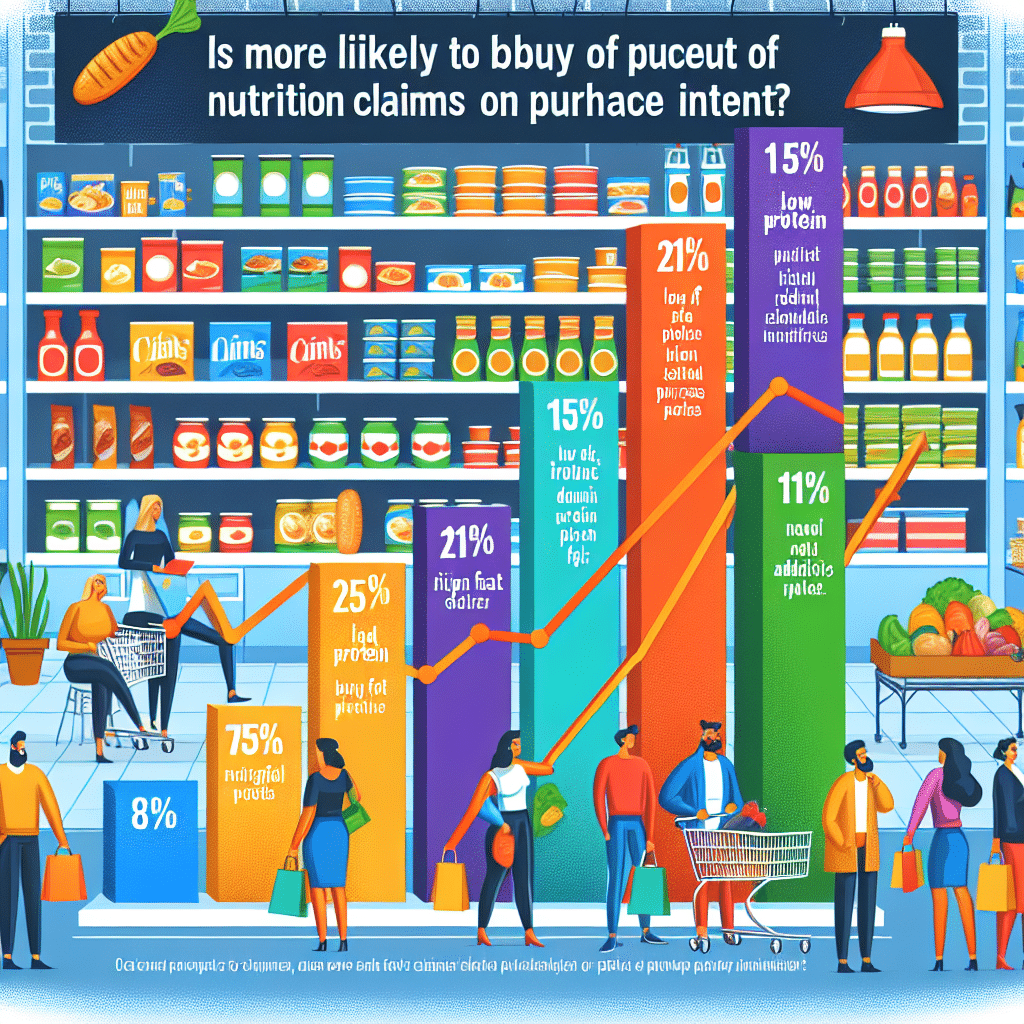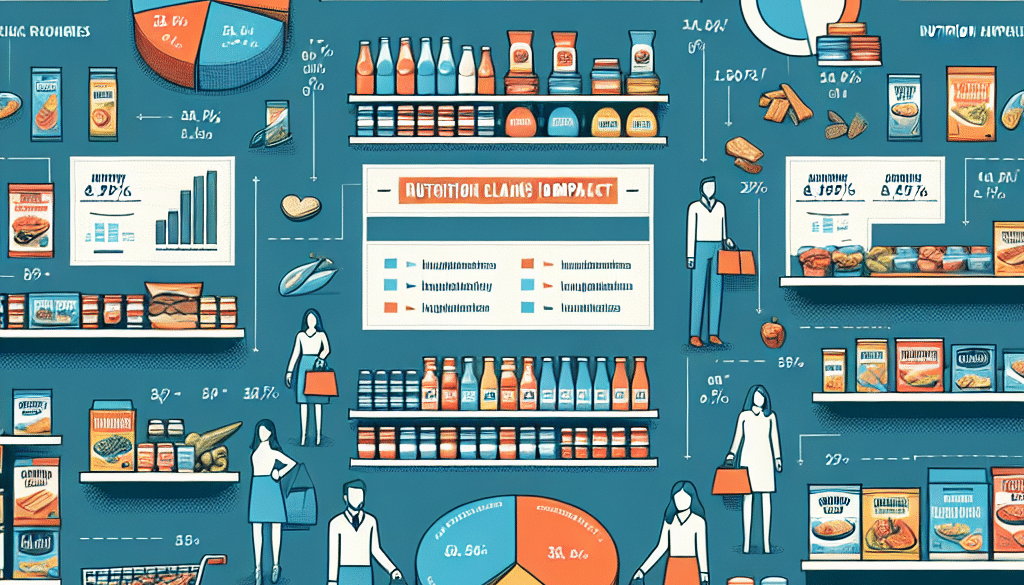Nutrition Claims Impact: Influencing Purchase Intent Study
-
Table of Contents
- Nutrition Claims Impact: Shaping Consumer Buying Decisions
- The Power of Nutrition Claims in Marketing
- Understanding Consumer Perception of Nutrition Claims
- Case Studies: Nutrition Claims and Purchase Intent
- Statistics: The Numbers Behind Nutrition Claims
- Regulation and Consumer Trust
- Conclusion: Nutrition Claims as a Double-Edged Sword
- ETprotein: Your Trusted Source for High-Quality Protein Products
Nutrition Claims Impact: Shaping Consumer Buying Decisions

In the realm of consumer goods, particularly within the food and beverage industry, nutrition claims on packaging play a pivotal role in influencing purchase intent. These claims, which range from ‘low-fat’ and ‘sugar-free’ to ‘high in protein’ and ‘rich in vitamins,’ are designed to catch the eye of health-conscious shoppers and persuade them to choose one product over another. This article delves into the impact of nutrition claims on consumer behavior, supported by research studies, case examples, and statistics.
The Power of Nutrition Claims in Marketing
Nutrition claims are a powerful marketing tool. They serve as quick signals to consumers about the potential health benefits or nutritional value of a product. The influence of these claims on purchase intent is well-documented, with numerous studies indicating that they can significantly sway consumer choices.
- Health-conscious consumers are more likely to be drawn to products with positive nutritional claims.
- Claims such as ‘low-calorie’ or ‘high-fiber’ can make products more appealing to those on specific diets.
- Even when not actively dieting, many consumers prefer products that suggest a healthier choice.
Understanding Consumer Perception of Nutrition Claims
Consumer perception of nutrition claims is not always straightforward. While some shoppers are well-informed and can discern between genuine health benefits and marketing tactics, others may be misled by claims that sound beneficial but offer little real health value.
- Some consumers may not understand the specifics of nutrition claims and base their decisions on a general sense of a product being ‘healthy’.
- There is a tendency to overestimate the healthiness of a product based on a single claim, ignoring other nutritional information.
- Claims such as ‘organic’ or ‘natural’ can be particularly persuasive, even when they do not directly relate to the nutritional content of the product.
Case Studies: Nutrition Claims and Purchase Intent
Several case studies highlight the impact of nutrition claims on consumer behavior:
- A study on breakfast cereals found that claims like ‘whole grain’ and ‘fiber’ increased purchase intent among parents shopping for their children.
- Research on snack foods indicated that ‘low-fat’ labels led to higher sales, even when the calorie content was the same as full-fat versions.
- A survey on dairy products showed that ‘probiotic’ claims resulted in a higher willingness to pay among consumers seeking digestive health benefits.
Statistics: The Numbers Behind Nutrition Claims
Statistics offer a clear picture of how nutrition claims can influence purchase decisions:
- According to a Nielsen survey, 59% of consumers have difficulty understanding nutrition labels, which can lead to reliance on simplified claims.
- A study by the Food and Drug Administration (FDA) found that 77% of adults use nutrition labels when buying a product for the first time, indicating the importance of clear claims.
- Research by the International Food Information Council (IFIC) Foundation revealed that 47% of consumers look for products with ‘natural’ claims, despite varying definitions of the term.
Regulation and Consumer Trust
Regulatory bodies play a crucial role in ensuring that nutrition claims are accurate and not misleading. Trust in these claims is essential for their effectiveness in influencing purchase intent.
- In the United States, the FDA regulates nutrition claims to ensure they meet specific criteria.
- The European Food Safety Authority (EFSA) oversees nutrition claims within the European Union, with similar standards.
- Consumer trust can be eroded by false claims, leading to skepticism and reduced impact on purchase decisions.
Conclusion: Nutrition Claims as a Double-Edged Sword
Nutrition claims can be a double-edged sword. On one hand, they provide valuable information that can help consumers make healthier choices. On the other hand, they can be misinterpreted or misused, leading to confusion and potentially unhealthy decisions. It is essential for consumers to educate themselves on how to read and understand nutrition labels and for regulatory bodies to continue enforcing strict guidelines on nutrition claims.
ETprotein: Your Trusted Source for High-Quality Protein Products
For those seeking to make informed choices about their protein intake, ETprotein offers a range of high-quality protein products that cater to various dietary needs. Their organic and non-GMO protein options, such as rice protein, pea protein, and pumpkin seed protein, are perfect for health-conscious consumers looking to supplement their diet with clean, allergen-free protein sources. ETprotein’s commitment to purity and quality ensures that you can trust the nutrition claims on their products, making them a reliable choice for your nutritional needs.
About ETprotein:
ETprotein, a reputable protein and L-(+)-Ergothioneine (EGT) Chinese factory manufacturer and supplier, is renowned for producing, stocking, exporting, and delivering the highest quality organic bulk vegan proteins and L-(+)-Ergothioneine. They include Organic rice protein, clear rice protein, pea protein, clear pea protein, watermelon seed protein, pumpkin seed protein, sunflower seed protein, mung bean protein, peanut protein, and L-(+)-Ergothioneine EGT Pharmaceutical grade, L-(+)-Ergothioneine EGT food grade, L-(+)-Ergothioneine EGT cosmetic grade, L-(+)-Ergothioneine EGT reference grade and L-(+)-Ergothioneine EGT standard. Their offerings, characterized by a neutral taste, non-GMO, allergen-free attributes, with L-(+)-Ergothioneine purity over 98%, 99%, cater to a diverse range of industries. They serve nutraceutical, pharmaceutical, cosmeceutical, veterinary, as well as food and beverage finished product distributors, traders, and manufacturers across Europe, USA, Canada, Australia, Thailand, Japan, Korea, Brazil, and Chile, among others.
ETprotein specialization includes exporting and delivering tailor-made protein powder and finished nutritional supplements. Their extensive product range covers sectors like Food and Beverage, Sports Nutrition, Weight Management, Dietary Supplements, Health and Wellness Products, and Infant Formula, ensuring comprehensive solutions to meet all your protein needs.
As a trusted company by leading global food and beverage brands and Fortune 500 companies, ETprotein reinforces China’s reputation in the global arena. For more information or to sample their products, please contact them and email sales(at)ETprotein.com today.












